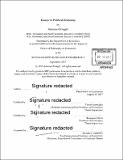Essays in political economy
Author(s)
Ornaghi, Arianna; Banerjee, Abhijit V; Finkelstein, Amy; Hanna, Rema; Olken, Benjamin A; Sumarto, Sudarno, 1960-; ... Show more Show less
DownloadFull printable version (12.77Mb)
Other Contributors
Massachusetts Institute of Technology. Department of Economics.
Advisor
Daron Acemoglu and Benjamin Olken.
Terms of use
Metadata
Show full item recordAbstract
This thesis consists of three chapters. The first two chapters explore how different organizational forms, and in particular different hiring and firing practices, affect bureaucracies. In the first chapter, I study how the introduction of merit systems reducing politicians' control over police officers' hiring and firing affected police performance in the 1970s. I exploit population-based mandates for police department merit systems in a regression discontinuity design. Merit systems improved performance: in the first ten years after the reform, the property crime rate was lower and the violent crime clearance rate was higher in departments operating under a merit system than in departments operating under a spoils system. I explore three possible channels: resources, police officers' characteristics and police officers' incentive structure. Employment and expenditures were not affected and there is limited evidence of selection changing pre-1940. Instead, I provide indirect evidence that changes in the incentive structure faced by police officers were likely important. In the second chapter, I study how the introduction of civil service boards in charge of meritocratic hiring affected the demographic composition and the performance of police officers, fire fighters and other municipal employees 1900-1940. Identification exploits the staggered timing of the reform in large municipalities using a differences-in-differences design. I find that civil service boards decreased the probability that police officers were first or second generation immigrants but mixed evidence on how the demographic characteristics of other workers were affected. Finally, I find that no effect on police performance. The third chapter, joint with with Abhijit Banerjee, Amy Finkelstein, Rema Hanna, Benjamin Olken, and Sudarno Sumarto, analyzes a large-scale experiment in Indonesia. In particular, we study how a national governmental health insurance program characterized by flexible coverage responds to subsidies and assisted registration through a website. Lowering prices and reducing hassle costs increase enrollment but households often let their coverage lapse. Subsidies attract healthier households in the short run, but over time the average value of claims equalizes because of differential claim dynamics. Overall, we find that, when dynamic adjustments to coverage are possible, subsidies do not improve the financial sustainability of health insurance programs.
Description
Thesis: Ph. D., Massachusetts Institute of Technology, Department of Economics, 2017. Cataloged from PDF version of thesis. "Joint with Abhijit Banerjee, Amy Finkelstein, Rema Hanna, Benjamin Olken, and Sudarno Sumarto"--Page 115, Chapter 3. Includes bibliographical references (pages 151-156).
Date issued
2017Department
Massachusetts Institute of Technology. Department of EconomicsPublisher
Massachusetts Institute of Technology
Keywords
Economics.